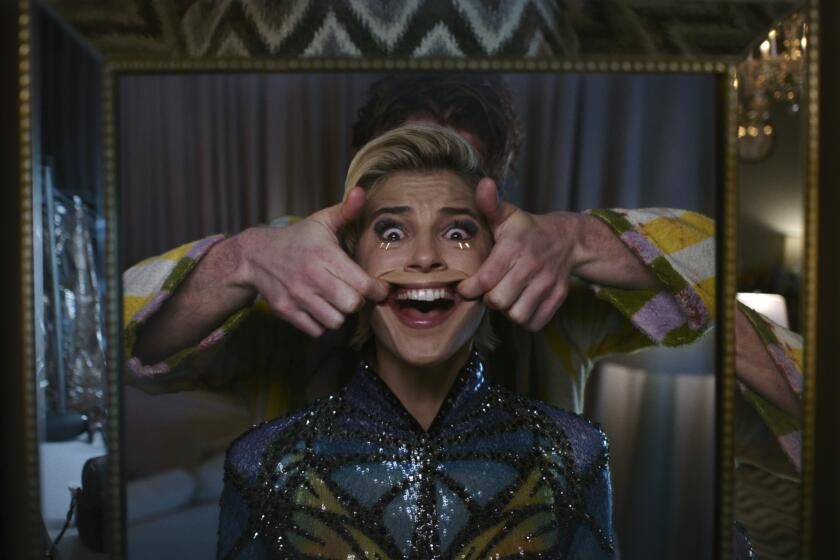Review: Viggo Mortensen and Mahershala Ali’s chemistry puts the crowd-pleasing ‘Green Book’ in overdrive
Consider this a warning. You may be tempted to push back against “Green Book,” may be itching to proclaim it too pat, too obvious, too much of a setup job, but resistance, as they say, is futile. It’s deeply embedded in this film’s DNA to make us feel good, and, really, what could be wrong with that?
Co-written and directed by Peter Farrelly, of all people, and “inspired by a true friendship,” “Green Book” is a savvy and super effective piece of popular entertainment that unexpectedly walked off with the Toronto International Film Festival’s Oscar predictive People’s Choice Award.
The film is a bit like “The Odd Couple” joined to a 21st century version of “Driving Miss Daisy,” with superior acting by two of today’s top actors — Viggo Mortensen and Mahershala Ali — sealing the bargain.
Mortensen’s character, Italian American driver Frank Anthony Vallelonga, known to all as Tony Lip, is full of self-satisfied swagger, while Ali’s Jamaican passenger, Dr. Don Shirley, is a man of dignity, even hauteur.
Both actors are effective counterpunchers, expertly gaining strength from each other like tag team wrestlers on a tear. Working together, they’re able to convince us that this hugely unlikely but reality-based friendship could actually have happened (Vallelonga’s son Nick, who cowrote with Brian Currie and Farrelly, provided the bona fides).
Farrelly, best known for co-directing lowest common denominator comedies like “Dumb and Dumber” with his brother Bobby, may seem a surprising choice to direct a film that deals, even in a crowd-pleasing way, with as serious a subject as racism in America.
But the best of the Farrelly comedies, like 1998’s “There’s Something About Mary,” underline the director’s instinct for the mechanics of audience response — for knowing where the buttons are and how to push them — that stands him in good stead with this somewhat more thoughtful material.
Tony Lip is the character introduced first, working at Manhattan’s Copacabana nightclub in 1962, where his main duties appear to be tossing recalcitrant patrons into the street and driving his boss after work.
Back home in the Bronx, it’s clear that Tony loves his tolerant wife, Dolores (Linda Cardellini), who sighs and smiles when her husband risks the rent money by betting on himself in a hotdog-eating contest.
The twice Oscar-nominated Mortensen is an actor who doesn’t do things halfway, and he gained some 40 pounds and a ton of self-regard to play an individual nicknamed for his ability to BS anyone about anything.
Tony is also presented as an oblivious racist, someone who uses a variety of epithets to describe non-Italians and has very much of an arm’s length relationship with other ethnic groups.
In fact, in a quietly ugly moment, when two African American repairmen visit his apartment, Tony discreetly throws glasses they’ve drunk water out of into the trash.
“Green Book’s” plot kicks into gear when the Copa is closed for two months for renovations and Tony is desperate for a job that doesn’t involve Mafia-related enforcer work.
He gets summoned to an apartment above Carnegie Hall where he meets Dr. Don Shirley, an individual he’s never even imagined.
Whip-smart and sophisticated, fluent in several languages and holder of doctoral degrees, Dr. Shirley is also a gifted pianist with his own style who greets Tony Lip wearing a dashiki and sitting on an African throne.
Dr. Shirley, for reasons we eventually discover, is about to embark on a concert tour that will take him to the Deep South. He needs not only a driver who can handle the brand new Cadillac Coupe de Ville his record company is providing, but also a bodyguard who has the kind of verbal and physical skills Tony can deliver.
There’s a little back-and-forth culture shock before Tony says yes (there’s no movie if he doesn’t) and, to help him out with logistics, Dr. Shirley presents a copy of the book that gives the film its title, “The Negro Motorist Green-Book,” first published by Victor Hugo Green in 1936 to help travelers in the segregated South find safe accommodation.
As the trip progresses, these two men unsurprisingly but convincingly get on each other’s nerves, with the immaculate Dr. Shirley evincing believable disgust at Tony Lip’s gusto for eating fried chicken without benefit of plates, dining implements or trash receptacles.
Also not unexpectedly, situations arise when Dr. Shirley comes to appreciate his companion’s good heart and particular skills, and Tony Lip gets more of a sense of the narrowness of his ideas as well as the kind of Deep South dangers and personal cruelties a man of color had to endure.
Though a lot of this, such as a racist police traffic stop in pouring rain, is obvious, even predictable, the integrity of both actors’ performances makes the lack of surprise less of a problem.
Though Mortensen dominates the early scenes, Ali’s Dr. Shirley is finally the more involving character, and “Green Book” doesn’t hesitate to take on the complexities of a man who despite Carnegie Hall appearances does not feel fully accepted in either the white world or the black one.
“Whatever you do, do it 100%,” Tony Lip says his father advised him. It’s a philosophy both the “Green Book” protagonist and the film itself have adopted, going all in and winning us over in the process.
----------
‘Green Book’
Rated: PG-13 for thematic content, language including racial epithets, smoking, and some violence and suggestive material
Running time: 2 hours, 10 minutes
Playing: AMC Century City; ArcLight, Hollywood; Landmark, West Los Angeles
More to Read
Only good movies
Get the Indie Focus newsletter, Mark Olsen's weekly guide to the world of cinema.
You may occasionally receive promotional content from the Los Angeles Times.











